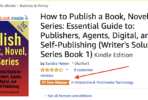Alert: The Gamble AFTER Readers Buy Your Book—and How to Be a Winner

What happens to your book AFTER it’s purchased? Huh? Why should you care? Publishers now DO care—and make decisions on marketing based on how readers read books! Too many writers concentrate only on:
- a colorful cover
- clever title
- and hot action on page 1
It’s the flashy stuff that sells their book… but they don’t think about what happens with that same book once it is in the reader’s hands. No longer is it just enough to entice readers to buy a book—authors needs to figure HOW that book will be read. Why? Because publishers now CARE!
Publishers and technical gurus are now creating and using reading apps to send info back on how readers actually read books! You buy a book from a publisher, say Kobo, and as you read it, your method of reading—whether all in one gulp, or only a few minutes at a time late at night or whatever—is fed back to the publisher.
They may learn that the reading habits of buyers of book XYZ is usually read quickly, with that “couldn’t put it down” quality but book ABC, the book they were pushing, which they have been promoting, isn’t even finished by readers! Yikes! Readers will hesitate to buy another book by that author OR pay attention to that publisher’s promotions after that. Suddenly the readability of a book plays into whether a publisher wants to keep promoting ABC or wants to start marketing XYZ instead.
It is a new concept (at least in this publishing world): care about the readers’ experience, not just their purchase. Why?
If a book is obviously being devoured by those who DO buy it, then it could/would be a book more readers would want to buy, which makes readers loyal to those publishers who offer great reads.
Authors need to care as well, because part of becoming a writer is realizing that it is readers’ experiences with a book that makes them buy—or not buy—your next book! Keep readers interested in you as an author and you turn those readers into fans. Fans spread the word. Their “word” is free promotion. So your real goal should not be to see your book sell, but to create a book that holds and pleases readers enough to want “More, please!”
A couple publishers are already working in this direction … no doubt more will follow. Technology providers are pushing for more publishers to consider the value of in-book reading data transmitted back to the publisher. According to an article in Book Business Magazine:
“This year ebook retailer Kobo launched an ebook data service, allowing publishers to see which of their books were purchased from Kobo and how they were engaged with. Kobo tracks where readers drop off in a book, how quickly they complete it, and when they actually sit down to read.
“We help publishers by saying, ‘This book is halfway down your list but it’s being read faster than your bestsellers. Maybe you should put some PR and social behind it,'” explains David Anderson, VP of vendor management at Kobo. Another e-reading solution provider, Bluefire Productions, can provide similar data to other publishers.
But the analysis doesn’t stop there. Readers of various genres read differently! So Kobo compares its reading behavior data across all of its titles, providing publishers benchmarks of what kinds of engagement and sales they should expect in romance vs. nonfiction, for example. Says Anderson, “But we want to show publishers the exceptions to this [benchmark] rule, the books that are being highly engaged with but are undersold. That is how you can create the next Fifty Shades of Grey or the next Harry Potter. Kobo’s data can help publishers find their next blockbuster.”
The lesson for writers: You think you know how to write a manuscript: Tricky titles and a hot scene on page one and a gripping back cover blurb will likely sell your book. But the word about how great your book is will only be spread if your whole book is enticing and holds readers. And spreading that word, getting those loyal fans, having a ready audience for Books 2 and 3 and beyond, well, that depends on a story that is consistently engaging from page 1 to “The End.” Yes, you still want a great opening and fine promotions, but just remember: the entirety of the story is what counts in the long run, making your current book just the stepping stone to ready readers of your future books.
New to “Sandra’s Tips”? Click here to sign up for my newsletters.
Follow me on Facebook or if you want information on my editing services, see my websites at Bristol Services Intl. or SandraHaven.com
Or just email me using the form below and let’s discuss YOUR book project!







